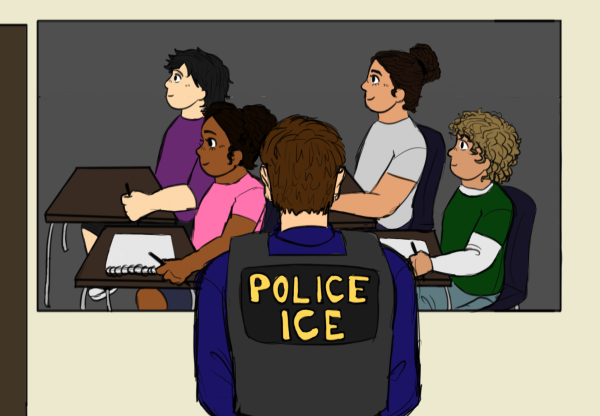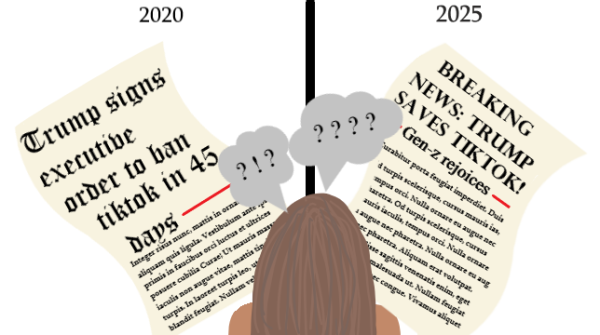Why we need to say gay

On Feb. 24, 2022, Republican Florida Governor Ron DeSantis signed and passed the “Parental Rights in Education” bill. As the title implies, the bill aims to “reinforce the fundamental right of parents to make decisions regarding the upbringing and control of their children.” Put simply, this bill will enable parents to limit discussions about gender identity and sexual orientation; the bill permits them to sue a school district shall LGBTQ+ topics be discussed in the classrooms.
Moreover, upon closer inspection, the bill reads that “classroom instruction by school personnel or third parties on sexual orientation or gender identity may not occur in kindergarten through grade 3 or in a manner that is not age-appropriate or developmentally appropriate for students in accordance with state standards.” As a result, critics and opponents of the bill nicknamed it the “Don’t Say Gay” bill. This bill is to take effect in Floridian schools July 1, 2022.
The consequences of this bill are imminent, as it targets and suppresses the LGBTQ+ youth of Florida. While the aforementioned bill will only affect LGBTQ+ students in Florida, it also poses a threat to students across the country.
According to “Not just Florida. More than a dozen states propose so-called ‘Don’t Say Gay’ bills” by Dustin Jones, numerous states such as: Alabama, Arizona, Georgia, Iowa, Louisiana, South Carolina, Missouri, Indiana, Kentucky, Oklahoma, Tennessee, Ohio and Texas are unfortunately following in Florida’s footsteps, as they are attempting to introduce legislation that also prohibits schools from discussing topics such as sexual orientation in their state.
Texas Governor Greg Abbott even went to the extreme of saying in a campaign email that he will make such a bill a “top priority” in the next legislative session in January 2023. Similarly to Florida’s ‘Don’t say gay’ bill, Texas’ rendition of the bill essentially achieves the same idea, prohibiting classroom lessons on sexual orientation—and it needs to stop before it opens up Pandora’s box. If an end is not put to this discrimination against LGBTQ+ individuals in schools, then it will strip them of a space that they feel they are able to express themselves freely if they cannot do so at their home.
Regrettably, what these politicians and lawmakers fail to realize is the number of people they will hurt with the introduction of these kinds of bills. Ultimately, librarians, teachers and students alike will struggle with the implementation of this bill, as it will lead to numerous complications such as potential legal issues and what falls under the scope of education relating to sexual orientation and gender identity.
For instance, according to an article in the Washington Post by Amber Phillips, interviewee Brandom Wolf, part of the LGBTQ+ advocacy group Equality Florida comments, “It begs the question of whether a teacher having a picture of a partner on their desk, or being asked to be referred to as Mr. or Mrs., if that counts as classroom instruction on gender identity.” This concern shows how flawed this legislation is. It leaves many educators and LGBTQ+ activists confused with unanswered questions as to what contends education surrounding LGBTQ+ topics. The legality of simple honorifics that we have used for our elders since entering school such as Mr. or Mrs. are being questioned considering that they are gendered terms.
These types of bills are posing serious threats to the young generation of LGBTQ+ students because their right to freedom of expression is being regulated. LGBTQ+ individuals may experience higher suicide rates compared to their heterosexual counterparts.
The Trevor Project found that “LGBTQ youth already face higher health and suicide risks than their cisgender or straight peers. When those kids are given access to spaces that affirm their gender identity, they report lower rates of suicide attempts.” In simpler terms, providing LGBTQ+ students the resources they need to discover themselves will ensure their success and aid in mitigating suicide rates amongst the community. Allowing for discussions regarding sexual orientation and gender identity in the classroom should not be up for debate, because education is a human right.
Therefore, to combat this prevalent issue plagueing young LGBTQ+ kids, freedom to discuss gender identity and sexual orientation should be stressed and incorporated in the classroom, as it is in Bonita Vista High. Having programs such as the Gay-Straight Alliance and Peer Counseling support groups is crucial to let the LGBTQ+ communnity thrive.
However, another section of the bill intends to prevent this, as parents are also being granted the ‘right’ to opt their children out of mental health services that are provided at their schools. They argue that discussing the sensitive issues they are experiencing will produce shame to the student. Although, educators assert that these services at school are extremely necessary, especially for potential LGBTQ+ students as they usually experience discrimination often.
As stated in an article by Brian Lopez and Emily Hernandez in the Texas Tribune, Val Benavidez, executive director of the Texas Freedom Network wraps up the argument perfectly by speaking on a bill very similar to Florida’s ‘Don’t say gay’ bill. He points out that the true danger does not lie with the education of LGBTQ+ topics, but with power-hungry political activists who seek to establish structural homophobia and transphobia in the education system.
“Gender expression by children is not something that is scary or harmful. What is scary is that political activists are grasping at power by overstepping into the lives of Texas families and education of students,” Benavidez said.

I am a senior at Bonita Vista High School and this is my second year on staff. I joined newspaper in order to achieve my full potential with my writing...

Hello, I am a senior at BVH and this is my fourth year as part of the Crusader staff. I am currently the Managing editor and was previously a News Editor,...




